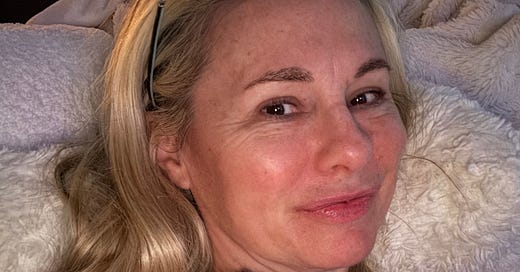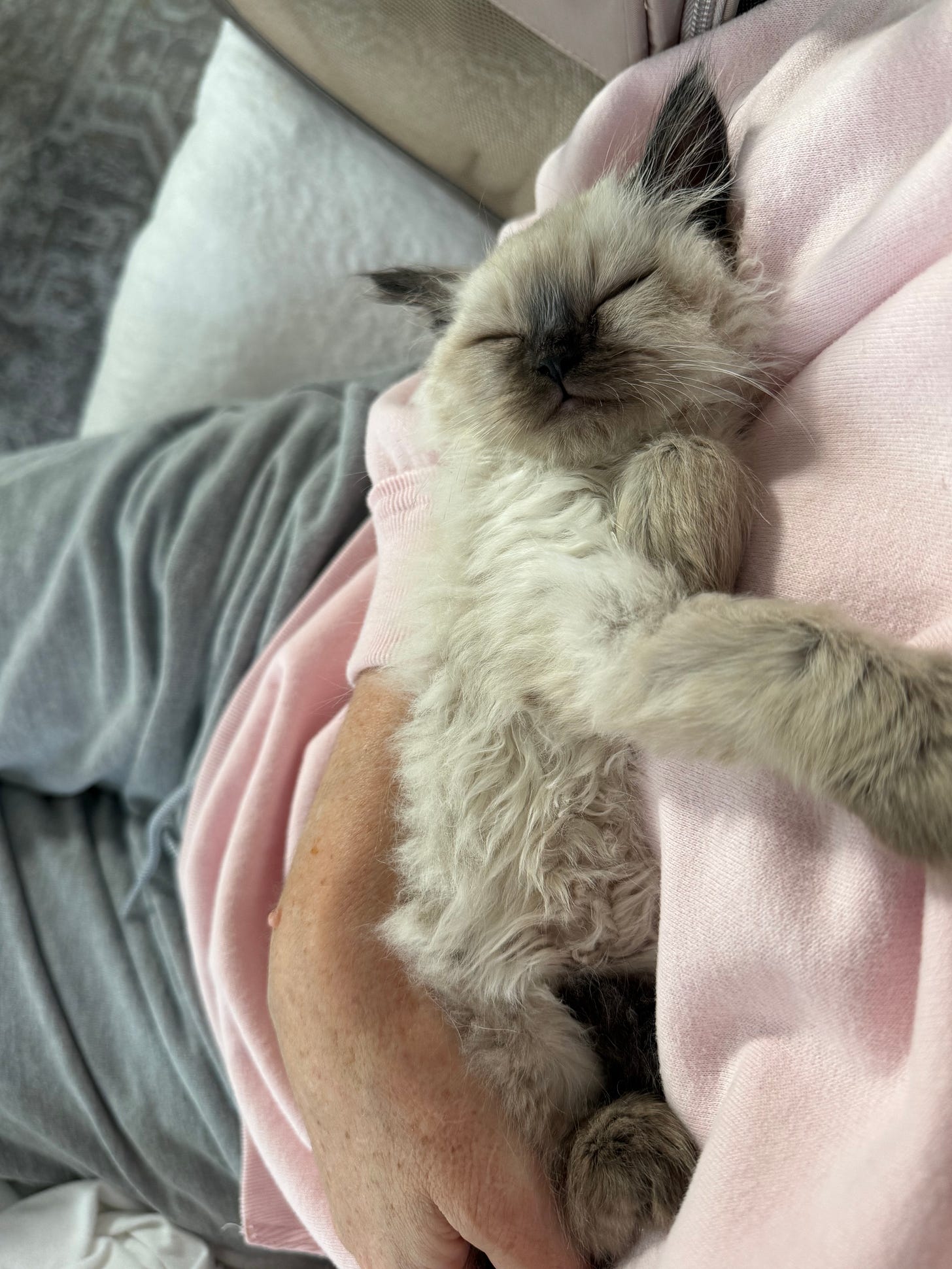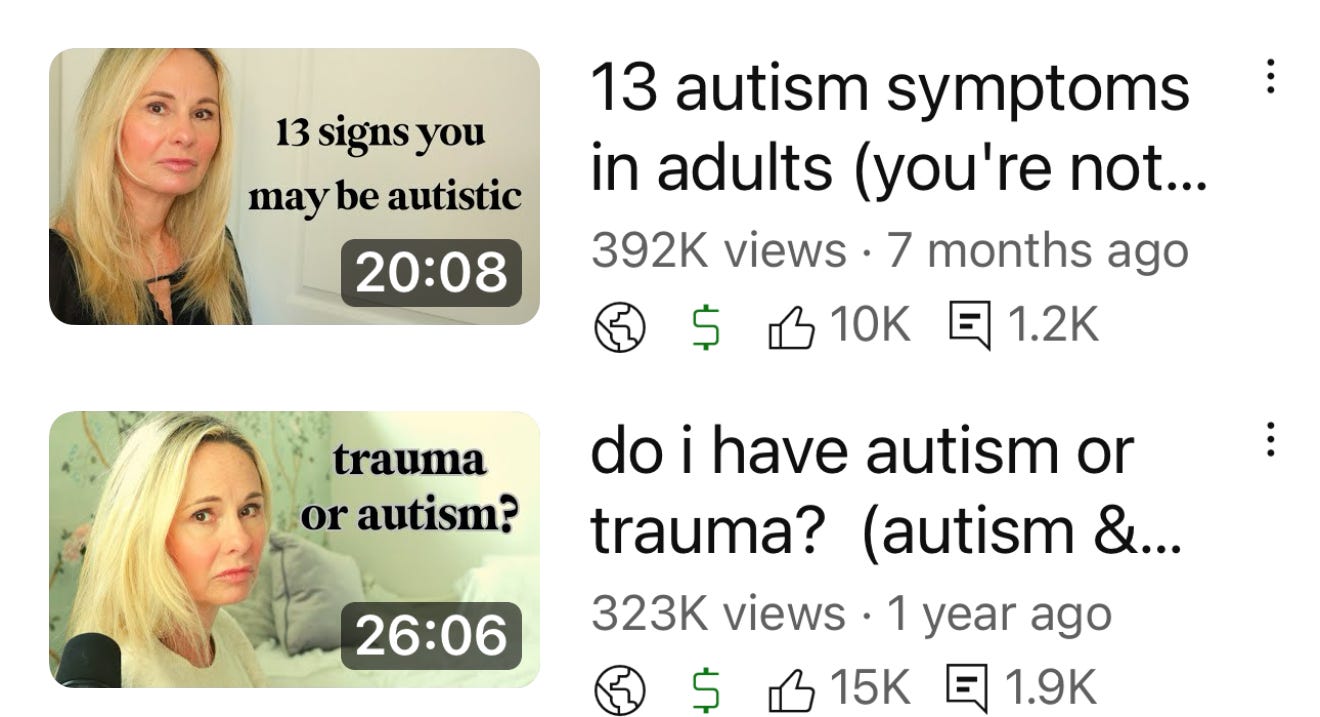What Did It Look Like When I Was Happy?
Female Phenotype Autism, High Masking Autistic Brains + Trauma
As I sit writing this week’s newsletter, I am wiping away tears. I’ve just watched one of my most favorite film scenes from one of my most favorite books: Eat. Pray. Love. The scene that always makes me cry is the one where Liz Gilbert goes to an Indian wedding with Richard from Texas, and the experience triggers her still deeply unresolved divorce grief.
Just before she leaves the wedding she has a conversation with a young bride who has been forced into marriage by her parents. Liz (Julia Roberts) has been praying for her happiness, but it’s a sad exchange: “What did it look like......when I was happy?”
Why has this particular scene made me cry? Because I have struggled with real happiness for most of my life. As an avid over-thinker and over-feeler, someone with too much empathy and too many thoughts - happiness has been elusive. Can I laugh most days and find little moments of joy? Yes, but.
I say yes, but — because I believe with every ounce of my being that the combination of a lifetime of trauma, alongside a neurodivergent brain, has made it feel like consistent happiness is always just beyond my reach.
It’s quite a challenging prospect to even stay in contentment with a never ending train of trauma, and a brain that is always anxious, always playing out 10 different scenarios, a brain that is overly focused on justice and worried about others — while at the same time that brain has been trained to hyper-focus, to be hyper-vigilant to other people’s big emotions —while also believing it’s my job to emotionally regulate everyone else, all of the time.
It’s left little time for me to focus on my own emotions - and yet, having an autistic brain (for me) feels like I simultaneously over feel and over think every single damn thought and emotion of my own— while also absorbing everyone else’s thoughts and emotions. It’s so fucking exhausting.
And yet, I know that I am not alone. When I read through the newest research on high masking autism in women and girls - on the continually emerging research finding a “female phenotype” or socially internalizing type of autism - I finally have a way to make sense of myself. To validate myself.
“Socializing, Sensitivity/Sensory Issues and Finding Refuge Alone”
(these are just 3 categories from Samantha Craft’s Unofficial List of Autistic Traits)

Section E: Social Interaction
Friends have ended friendship suddenly (without female with AS understanding why) and/or difficult time making friends
Tendency to overshare
Spills intimate details to strangers
Raised hand too much in class or didn’t participate in class
Little impulse control with speaking when younger
Monopolizes conversation at times
Brings subject back to self
Comes across at times as narcissistic and controlling (is not narcissistic)
Shares in order to reach out
Often sounds eager and over-zealous or apathetic and disinterested
Holds a lot of thoughts, ideas, and feelings inside
Feels as if she is attempting to communicate “correctly”
Obsesses about the potentiality of a relationship with someone, particularly a love interest or feasible new friendship
Confused by the rules of accurate eye contact, tone of voice, proximity of body, body stance, and posture in conversation
Conversation are often exhausting
Questions the actions and behaviors of self and others, continually
Feels as if missing a conversation “gene” or thought-filter
Trained self in social interactions through readings and studying of other people
Visualizes and practices how she will act around others
Practices/rehearses in mind what she will say to another before entering the room
Difficulty filtering out background noise when talking to others
Has a continuous dialogue in mind that tells her what to say and how to act when in a social situation
Sense of humor sometimes seems quirky, odd, inappropriate, or different from others
As a child it was hard to know when it was her turn to talk
Finds norms of conversation confusing
Finds unwritten and unspoken rules difficult to grasp, remember, and apply
Section F: Finds Refuge when Alone
Feels extreme relief when she doesn’t have to go anywhere, talk to anyone, answer calls, or leave the house but at the same time will often harbor guilt for “hibernating” and not doing “what everyone else is doing”
One visitor at the home may be perceived as a threat (this can even be a familiar family member)
Knowing logically a house visitor is not a threat, but that doesn’t relieve the anxiety
Feelings of dread about upcoming events and appointments on the calendar
Knowing she has to leave the house causes anxiety from the moment she wakes up
All the steps involved in leaving the house are overwhelming and exhausting to think about
She prepares herself mentally for outings, excursions, meetings, and appointments, often days before a scheduled event
OCD tendencies when it comes to concepts of time, being on time, tracking time, recording time, and managing time (could be carried over to money, as well)
Questions next steps and movements, continually
Sometimes feels as if she is on stage being watched and/or a sense of always having to act out the “right” steps, even when she is home alone
Telling self the “right” words and/or positive self-talk (CBT) doesn’t typically alleviate anxiety. CBT may cause increased feelings of inadequacy.
Knowing she is staying home all day brings great peace of mind
Requires a large amount of down time or alone time
Feels guilty after spending a lot of time on a special interest
Uncomfortable in public locker rooms, bathrooms, and/or dressing rooms
Dislikes being in a crowded mall, crowded gym, and/or crowded theater
Section G: Sensitive
Sensitive to sounds, textures, temperature, and/or smells when trying to sleep
Adjusts bedclothes, bedding, and/or environment in an attempt to find comfort
Dreams are anxiety-ridden, vivid, complex, and/or precognitive in nature
Highly intuitive to others’ feelings
Highly empathetic, sometimes to the point of confusion
Takes criticism to heart
Longs to be seen, heard, and understood
Questions if she is a “normal” person
Highly susceptible to outsiders’ viewpoints and opinions
At times adapts her view of life or actions based on others’ opinions or words
Recognizes own limitations in many areas daily, if not hourly
Becomes hurt when others question or doubt her work
Views many things as an extension of self
Fears others opinions, criticism, and judgment
Dislikes words and events that hurt animals and people
Collects or rescues animals (often in childhood)
Huge compassion for suffering (sometimes for inanimate objects/personification)
Sensitive to substances (environmental toxins, foods, alcohol, medication, hormones, etc.)
Tries to help, offers unsolicited advice, or formalizes plans of action
Questions life purpose and how to be a “better” person
Seeks to understand abilities, skills, and/or gifts
Do you see yourself in these lists? Here’s the full list for further review:
Is it just me, or does it seem like being consistently content seems quite challenging for those of us with trauma and neurodivergence - especially right now? (forget about happy! that’s too much of a stretch!)
So, what can we do? Well, this substack would need to be another 500 pages long - but I can tell you that focusing on my animals (ie my newest baby kitten Bear:), my kids, my favorite shows and music, taking walks along the seaside, eating yummy food, taking time alone with zero input/noise from anyone or anything, and writing - bring me as close to happy as I am able.
I am learning to keep my expectations simple, basic and minimal - essentially I am trying to NOT over-think and over-feel my happiness one way or the other.
Most days it works, some days, some weeks it doesn’t.
And, you know what, that is ok with me.
What about you?
xo
13 Signs You Might Be Autistic
Link above to YouTube vids:)








Thank you so much for this. I found you a few years ago, and I think we've been going through the discovery journey of autism simultaneously. I would do my own research, and then see you posting about the same thing. It's been helpful to see someone else in the same place. I also have tons of trauma from an eggshell mom, and it took moving to Berlin from Texas at 44 years old to get the distance I needed to really find out who I was. Yeah, so late diagnosed ADHD and autism, trauma and perimenopause/menopause, now at 47, everything makes so much more sense. I'm happier, away from America's unrealistic expectations of neurodivergent productivity, and deep-seated criticism of my mother. Now, everything is on my terms. And I would like to thank you and your content for being a source of support throughout this.
Thankyou Dr Kim, reading this has literally ticked every one of my boxes. That line from the movie really hit a nerve and basically resonated with my entire life 😢. It was when I was being assessed for ADHD that the psychiatrist mentioned had I thought about the possibility of being Autistic as I was showing strong traits. With the fact that I have 3 grandchildren on the spectrum and an AuDhd daughter I had some ideas but with going into so much research over the last 2 years many of my traits pointed to ADHD. I have been treated for anxiety and clinical depression for most of my life, including as a child, I’m now 69 and last year diagnosed AuDhd. Thanks to finding yours and other similar YouTube channels and content I’m finally able to understand and accept who I really am! 🙏🏻